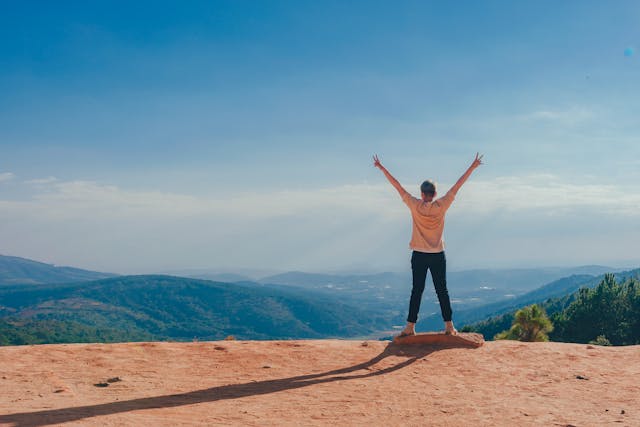
I’m going to kick things off by chatting about the ‘why’ behind goal setting, particularly for you who are just getting your boots muddy in the world of hiking. You’re going to find out about the magnetic pull of personal milestones that reach way beyond that picturesque horizon.
This isn’t just about ticking off trails on a list; it’s also about experiencing self-growth and transformation. Imagine standing atop a hill, catching your breath not just from the climb, but from the awe of realizing how far you’ve come since you began. That right there is the power of a well-placed goal.
Why are hiking goals for beginners so important?
In my opinion, setting clear, defined goals carves out a pathway to success in your hiking adventures. It adds value to each step by aligning your physical efforts with your psychological satisfaction. In essence, it turns what could be a wandering amble into an epic journey that’s both rewarding and structured.
Crafting Your Path: Embracing SMART Goals for Hiking Success
Alright, so you understand why setting goals can turbocharge your hiking experience. Now, I’m going to break down the SMART acronym, a method that’s great for helping you craft precise and attainable goals. SMART stands for Specific, Measurable, Achievable, Relevant, and Time-bound. Let’s get into how each of these components applies to your hiking aspirations.
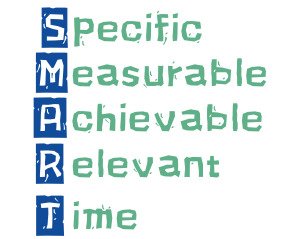
- Specific: Specific goals leave no room for confusion. Instead of saying ‘I want to hike more,’ you might say, ‘I plan to hike a local 5-mile trail within the next two months.’ See the difference? The more specific you are, the clearer your path becomes.
- Measurable: You’ve got to be able to track your progress. That could mean setting a goal to hike three times a month or conquering a trail with a specific elevation gain. When you can measure it, you can manage it.
- Achievable: There’s no point in aiming for a mountaintop if you haven’t mastered the foothills. Be honest with yourself about what’s within reach right now, and plan for bigger adventures as you grow stronger and more skilled.
- Relevant: This means your hiking goals should align with your personal reasons for hitting the trails. Whether it’s to improve your fitness, clear your mind, or explore new places, your goals should resonate with you and what you love about hiking.
- Time: Deadlines can be powerful motivators! They give you a timeframe to work towards and make it easier to commit to the steps you’ll need to take to reach your target.
Staying Grounded: The Art of Setting Realistic Hiking Goals
Stepping into the world of hiking means setting goals that catapult your enthusiasm without leaving you demoralized. It’s about finding that perfect balance between your burning ambitions and what’s achievable as you’re starting out. This isn’t just about picking a trail; it’s about assessing what you’d both enjoy and realistically accomplish.
The key to improving your hiking prowess without getting overwhelmed is to lay out a strategy that pushes you just enough. Think of it this way: Your targets should kindle a fire within, but not be so lofty they snuff that flame out with discouragement. It’s crucial to equip yourself with knowledge and get a rough gauge of your initial capabilities. Maybe your first goal is to hike a certain trail non-stop, or to reach an elevation you haven’t conquered before.
A wise approach is to consider factors like your current fitness level, any physical limitations, time availability, and access to trails. Don’t go planning a fourteener when your body is saying, ‘Hey, let’s start with the foothills.’ It’s totally fine to keep it simple — a series of short day hikes can be as beneficial and gratifying as a single strenuous one.
Celebrate the milestones, no matter how small. Each time you hit a trail, you’re learning something new about the terrain, about nature, and importantly, about yourself. Pat yourself on the back for the progress. Each step is a victory, building your confidence for longer, more challenging adventures ahead. Discover more about starting out here.
Now, I’m going to toss a few practical pointers your way for setting realistic goals. Use them as a compass to guide your decision-making process. For example, choose a trail that’s known for its scenic beauty at a moderate distance. You can always bump up the difficulty on your next outing. Or, set a goal to hike once a week. This builds a solid foundation of frequent exposure and experience without overextending yourself.
The Journey Begins with a Single Step: Starting Small in Hiking
- Choice: Choosing that first trail can be both exciting and a bit daunting. Go for something that’s manageable but still offers a bit of challenge to get your feet wet (sometimes literally!). A local nature preserve trail or a short scenic loop at a national park could be the perfect start.
- Pace yourself: This is crucial. You’re going to find out about more than the physical demands of hiking; you’ll learn about your personal preferences, what inspires you, and what you need to work on. Celebrate the fact that you’re out there, moving forward, one step at a time. Every small achievement is a building block toward your next, bigger goal.
- More than steps: And remember, starting small isn’t just about shorter distances. It also means allowing yourself the opportunity to adjust to hiking gear, understanding trail etiquette, and honing your ability to read the map and landscape. These early experiences play a pivotal role in how well you’ll handle more challenging hikes down the road.
The biggest strides in hiking often come from the smallest steps. You might be eyeing those majestic mountain peaks now, but the key is to start where you are, with what you have. This isn’t just about treading lightly; it’s also about building a solid foundation.
Now as you start accruing these small wins, your confidence will begin to swell. That’s when you’ll be ready to set your sights on more physically demanding goals. Setting these goals isn’t about pushing your limits from day one; think of it as a gradual crescendo, building up your resilience and strength as you go.
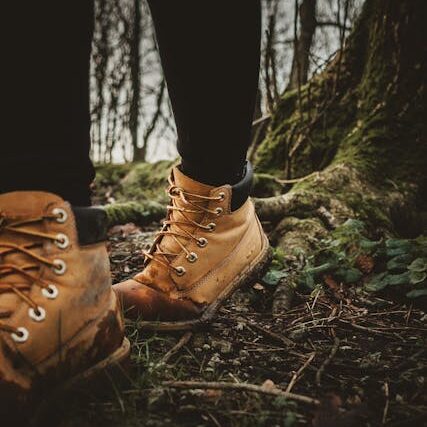
Scaling Peaks and Personal Bests: Setting Physical Goals for Hiking
You’re going to find out about the significance of physical preparedness in hiking. It’s not solely about stepping foot on the trail; it’s about equipping your body to take on nature’s challenges comfortably and safely. When setting physical goals, think of them as the four pillars of hiking fitness: endurance, strength, flexibility, and balance.
- Endurance: To develop endurance, start with cardio exercises. I’m talking brisk walking, jogging, or cycling. They’ll help you hike longer without feeling winded.
- Strength: For strength, especially in your lower body, squats and lunges are your best friends. A strong core is also vital, so include planks and push-ups in your routine.
- Flexibility: This might not be the first thing on your mind, but it’s crucial. Why? It helps prevent injuries and improves your overall mobility. Regular stretching, yoga, or pilates can do wonders here.
- Balance: This is just as important, especially on uneven terrain. Balance exercises or activities like tai chi can significantly improve your stability.
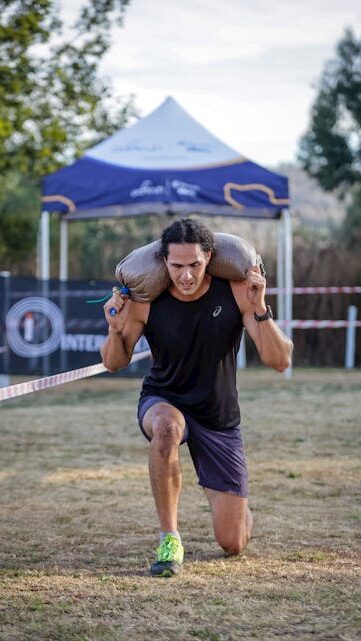
Now, let’s talk about setting motivational physical goals. Choose a hiking distance that stretches your current ability, but isn’t too far-fetched. Maybe aim to conquer a particular hill or mountain that’s been calling your name. If you’ve dreamed of a hiking holiday or tackling a well-known challenge, let that be your target. These goals act as a north star keeping you training with purpose.
When living in Italy, I committed to hiking every weekend in the spring in preparation for a week’s long hike around Mont Blanc in the summer. My weekly hikes gave me the stamina, strength and endurance to complete the 7 day hike. The morst arduous day of the hike had a total climb of 6561 Feet or 2000 Metres. The feeling of accomplishment when taking my last steps on that day was like nothing I had felt before. My hiking through the spring had paid off. For more information on Mont Blanc click this link.
Mapping The Path Ahead: Conclusion and Next Steps for Aspiring Hikers
I really hope that by now, you’re feeling inspired and equipped to tackle your hiking goals. It’s a thrilling experience to watch yourself grow stronger, more flexible, and increasingly adept at navigating the natural world. But remember, these goals aren’t just milestones; they’re your compass for an ongoing adventure.
In my opinion, it’s not just about the distance you can hike or the mountains you climb; it’s about the journey and the learning experiences along the way. Embrace the hiking community, share your stories, and learn from others. No hiker is an island, and the shared experiences can be incredibly enriching.
I’m here to help you recognize that your first attempt doesn’t need to be your last. The trails will always be there, inviting you to try again, aiming a little higher or pushing a bit further each time. Choose something that resonates with you, whether that be a serene forest hike, a picturesque coastal hike or the ambitious goal of conquering a challenging peak.
Don’t worry too much about hitting every mark right away. You can always adjust your approach down the road. What’s important is that you keep moving, stay safe, and find joy in every step. A lot is happening very quickly when you’re out there on the trail, from witnessing the subtle change of seasons to experiencing sudden shifts in weather—it’s all part of the hike.
So my question to you today is: What’s your next move? Are you ready to set some goals and see where they lead you? Remember to keep them SMART, achievable, and in line with your personal passions for the outdoors. Thanks for joining me on this journey, and I’ll be cheering for you every step of the way.
Happy hiking!
If you found this interesting and have comments ot questions, please leave them here.
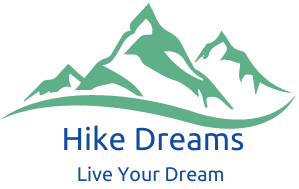
Goal-setting and hiking! I had never thought of connecting those two before. Great idea. Yes, each hike is an opportunity for development and getting to know yourself. I can’t count the times I have discovered something I didn’t know about myself in the face of a problem/accident, etc., out on the trail. Being out on the Earth is the perfect place to set meaningful goals.
How do you grade fitness for hiking, by the way? I think flexibility and balance are the two I like best out of your physical goals. I lived in the southern Pyrenees for many years, so I know what you mean about European mountain hikes. I’ve done the Mont Blanc hike many times!
Another really enjoyable article. Thank you!
Linden, Hiking certainly does test us. I think cardio fitness is most important, as it’s the engine room that keeps us going. Then strength, legs for climbs and core for balance. Flexibility is next and it helps with uneven terrain. Stamina or endurance is next as it determines low long we can walk for without having to stop for breaks. Someone with a low level of fitness would find a moderate trail challenging. Intermediate fitness would be able to hike a moderate trail with some ease. Someone with advanced fitness would cope on a challenging trail, for long hours and a heavier pack.
This article on setting hiking goals for beginners using the SMART method is incredibly insightful and motivating. I appreciate how it breaks down each step to create achievable and relevant goals. I have a question about balancing physical preparedness with the enjoyment of the hike. How do you recommend setting goals that challenge one’s fitness without taking away from the overall enjoyment and relaxation that hiking provides? Thank you for sharing such a comprehensive guide.
Hi Laura,
I’m glad you enjoyed the post. I would suggest by starting with walks that are easier in grade and length. Do your research, find out the height of the ascents go for walks that are easier and slowly build up to harder and longer walks. If your first walk is one with a huge hill or climbing out and you are not used to it, you won’t enjoy it. You will be surprised how your body responds to frequent hiking. I hike with 70 – 80 year olds and what they can do is amazing. The thing is to get out there and enjoy nature.
Setting goals for hikers beginners is essential if you are serious about it and if you want to persevere in the long run. personally, when I started hiking I didn’t have goals and I had a hard time following my friend who is a professional hiker! So I really need to start over and reach the goals I’ll set up concerning my hiking activities. Thank you!
Thanks. Goals can be many different things. Such as frequency in walking or distance of hikes, or elevation goals. The most important thing to remember is one step at a time. You can do it.
Hi, I just finished reading the post “Hiking Goals For Beginners – The SMART Way,” and I have to say, it really resonated with me. Setting goals using the SMART method (Specific, Measurable, Achievable, Relevant, Time-bound) is such a practical approach, especially for beginners who might feel overwhelmed by the idea of starting a new fitness routine like hiking.
One thing that stood out to me was the emphasis on being specific with your goals. It’s easy to say, “I want to hike more,” but turning that into a specific goal like, “I want to hike twice a week for 30 minutes” makes it much more manageable and trackable. I also appreciate the reminder to keep goals achievable and relevant. Sometimes, we set ourselves up for failure by aiming too high too soon. This method encourages realistic and meaningful progress, which is so important for staying motivated.
I’ve been wanting to get into hiking, and this post gave me the clarity and structure I needed. I’m planning to start with local trails and gradually work my way up to more challenging hikes. The idea of setting a timeframe to achieve these goals is also helpful—it keeps me accountable and focused.
Has anyone else tried using the SMART method for their hiking or fitness goals? I’d love to hear your experiences and any additional tips you might have!
When I first started hiking, I just aimed to complete a trail, but I quickly realized that setting smaller, manageable goals, like reaching a specific viewpoint or increasing my hike time gradually, made a huge difference. The advice on celebrating small victories is spot-on—I definitely felt more motivated each time I reached a new milestone.
Lyn, another wonderful article and right on point! I was going to start this comment off saying I was a beginner, but as I thought about it, I feel like I’m more of a beginner-intermediate. Early on, I was winded, tired, and stopping often—just going out to hike without much thought. Now, after reading this and reflecting, my wife and I have been working out regularly, and that same trail we take is now a breeze because we’ve conditioned ourselves. Our heart and muscles are truly S.M.A.R.T.! You’ve nailed it again. I can’t wait for more of your content!
– Opa
Ops, thanks. I’m glad you enjoyed it.
I often use the SMART method of setting goals, but I have not yet applied it to hiking adventures. So this is a very interesting way of using SMART goals when planning or setting out on your hiking experience. And after reading this, it makes so much sense to set realistic goals for your hiking trips.
And yes, it is not only about your physical endurance, but also your mental preparation. Not to forget the essential equipment as well. Many years ago, while living in South Africa, we walked the Otter Trail, which is a five-day hike. As a group we used to meet and did smaller one-day hikes to prepare ourselves. What a great experience it was.
Thank you for connecting goal setting and hiking for a more enjoyable experience.
Hi there, thanks for your comments. I haven’t heard about the Otter Trail. Will have to look it up. Too many great hikes to do in the world!